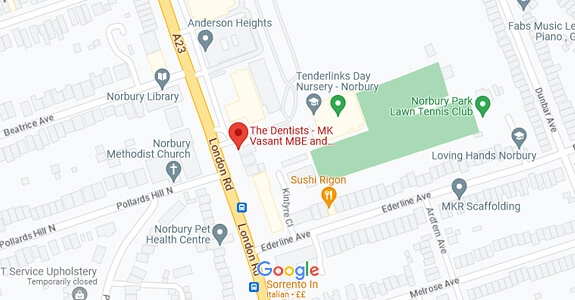These guys are ace! I'm terrified of the dentist but they made me feel so comfortable. I have had a couple of teeth taken out here and both times it was all over within five minutes! I cannot compliment this dentist enough, absolute blessings! Thank you so much!
Yes. Some people are so frightened of the dentist that they will not go for dental treatment. They can overcome their fears with relaxation or sedation. Our dentists are sympathetic about these feelings, and you can ask our dentists about these ways to help.
We offer an intravenous or IV sedation. This is given by injection, either in the back of your hand or in your arm. The dose will depend on the amount of treatment needed and the length of time it will take to complete.
You become drowsy and unaware of any treatment, but you are still able to co-operate with the dentist. The effects of sedative medicine take some time to wear off and your dentist will tell you how long the drugs will take to clear from your body. You won't be able to drink alcohol, drive or work machinery during this time.
When we are faced with a challenge or something we're afraid of, such as a visit to the dentist, our bodies produce substances, which raise our anxiety. However, we can train our bodies to work against this anxiety, by learning to relax. It's not possible to be anxious and relaxed at the same time, so learning relaxation helps control our anxiety.
Conscious sedation is a technique used in dentistry to provide relaxation and anxiety relief for patients who experience fear or anxiety during dental procedures. It involves the use of medications that help patients remain calm and comfortable while still being conscious and able to respond to the dentist's instructions.
Conscious sedation can be administered in different ways, depending on the patient's needs and the dental procedure. It can be given through oral medications, which are taken in the form of a pill or liquid. Alternatively, intravenous (IV) sedation can be used, where the sedative medication is administered directly into the bloodstream via a small needle.
Conscious sedation offers several benefits for patients during dental procedures. It helps alleviate dental anxiety, fear, and phobias, allowing patients to receive the necessary dental care without feeling overly stressed or panicked. Additionally, conscious sedation can improve cooperation with the dentist, enable longer procedures to be performed in fewer visits, and enhance the dentist-patient relationship.
Yes, conscious sedation is considered safe when administered by trained professionals (we outsource this treatment from anaesthetists who follow the appropriate guidelines and protocols). Before undergoing conscious sedation, the dentist will assess your overall health condition and take into account any pre-existing medical conditions or medications you might be taking to ensure a safe sedation experience.
No, conscious sedation is not intended to put you to sleep. It helps you feel relaxed and calm while remaining conscious and able to respond to the dentist's instructions. You will be able to understand and communicate with the dental team throughout the procedure.
The time it takes for conscious sedation to take effect varies from person to person, as well as the type of sedative used. Oral sedatives may take 30 minutes to an hour to start working, while IV sedation usually takes effect more quickly.
You may have limited memory of the dental procedure while under conscious sedation. Many patients report that they remember little to nothing about the procedure due to the amnesic effects of the sedative medication. However, you will still be able to communicate and respond during the procedure.
Conscious sedation is suitable for most patients, especially those with dental anxiety or phobias. However, certain conditions, such as pregnancy, severe respiratory problems, and some medical conditions, may require additional precautions or make conscious sedation unsuitable. It is important to discuss your medical history with your dentist to determine if conscious sedation is a viable option for you.
The duration of the sedative effect depends on the type and dose of the medication used. Some oral sedatives may last for a few hours, while IV sedation typically wears off more quickly. After the procedure, you will be monitored until you are fully recovered and fit to leave the dental practice.
Conscious sedation is generally safe, but like any medical procedure, there may be potential side effects. These can include drowsiness, nausea, headache, dry mouth, or temporary memory impairment. Your dentist will provide you with detailed postoperative instructions and monitor you throughout the procedure to ensure your safety and well-being.
Your dentist will provide specific instructions on how to prepare for conscious sedation. In general, you may need to avoid eating or drinking for a certain period before the procedure to prevent complications. Additionally, you may be advised to have a responsible adult accompany you to the appointment and care for you afterwards, as you may still feel drowsy or disoriented.


